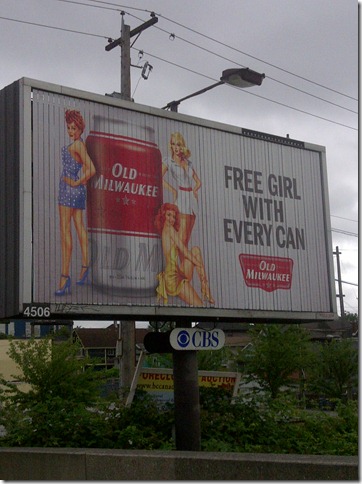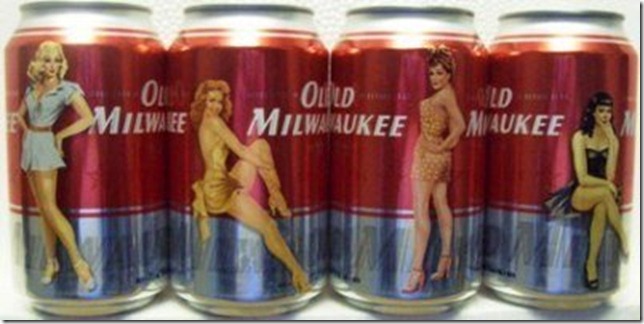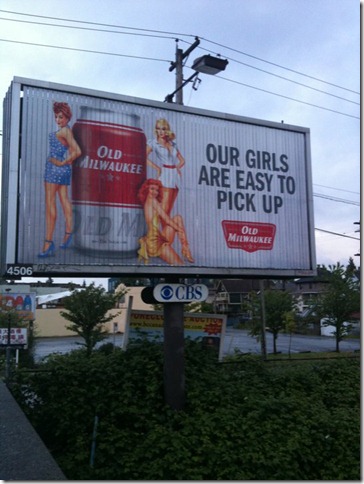“Retro” Sexism: The Desperation of Sleeman – Old Milwaukee “Free Girl”Ad Campaign
by Angela Marie MacDougall
When doing the work to end violence against women there is no shortage of opportunities where we have to decide what battles to fight and how to fight them. In order to seek change for individual women, for our relationships and gender relations, for our communities, the policies, the laws and for the larger society at BWSS we find ourselves working on all these fronts. Presently with, six – ten women a day seeking crisis support for their first time at Battered Women’s Support Services, increases of women arrests for allegedly perpetrating domestic violence, deportations of women who are in Canada fleeing gender persecution, the denial of women’s voices at the BC Missing Women’s Commission of Inquiry, reports of another woman sexually assaulted at First United Church Shelter, the, seemingly, stalled BC Highway of Tears investigation, “Free Girl With Every Can” the latest ad campaign for Old Milwaukee beer provided another opportunity to decide if it would be wise to syphon energy to respond to something so obviously offensive. At first glance I wondered if this was a cynical trap laid to get the “feminists” and the “frat-boys” riled up and trading barbs to the tune of increased revenue for the brewer.
The photo above of the latest ad displayed on a billboard located at the corner of Hastings and Glen in Vancouver, BC was snapped with the ever present camera phone during a sunrise coffee run. The billboard is positioned a block or so from the stroll where men from homes with manicured lawns and with car seats in the back of their vehicles troll the streets and alleys looking for a blow job or a fuck that they may (or may not) pay a girl or a woman for. Just like the location for the billboard ad is not an accident, neither is the treatment of women as objects that come free will beer.
Objectification of girls and women is at the heart of intimate partner violence. Not only are images of our bodies and body parts used to sell everything in marketing, not only with the advent of pixel manipulation literally morphing images of women into objects, for the women who we see at BWSS the very actions of emotional, physical, and sexual abuse by men requires that he turn her into an object in order to do the abuse and violence. Here’s our blog on Beauty and Body Image in the Media. What we know through our work with women and through our own lives is when male partners use violence it isn’t, Tina, Maria, Diana, Jasmine that is being beat it is that “fucking bitch”, that “fat cow” that “stupid cunt”. Rendering women into an object is at the beginning, middle and end of abusive/violent incidents and abusive/violent relationships. In fact, when I worked as a counsellor with men facilitating batterer treatment groups, one of the group exercises we had men participants accomplish was to ensure that every time they referred to their female partner that they used her name. Time after time it was a challenge as group participants struggled to use women’s given names instead defaulting to terms like: “my old lady”, “that one I live with”, “my woman”, “the wife”, “the girlfriend” and worse.
Misogyny and sexism in beer advertising is a well worn path and Old Milwaukee (in Canada brewed by Sleeman Breweries which is owned by Sapporo Breweries based in Japan) has positioned themselves as a leading sexist advertiser including their 1991 Swedish Bikini Team campaign. Highly popular with their target market the brewer was forced to drop the ads after protests from the National Organization of Women. With their jobs at stake, Strohs (the then US owner) faced a lawsuit from their own employees who claimed the campaign contributed to sexual harassment and discrimination.
Matter of fact, sexism in advertising has morphed recently and “Retro Sexism and “Uber Ironic” advertising is becoming industry standard with a few companies leading the way. Retro sexism can be defined as modern attitudes and behaviours that mimic or glorify sexist aspects of the past in an ironic way.
“Honestly, not sure I like the girls on the cans in the first place. Never mind the ads on the bill boards.” said Bernadette Keenan in a Facebook comment. And she makes an excellent point, Old Milwaukee went with old school pin up images of women on their cans in 2010, harkening backward. Anita from Feminist Frequency breaks down Retro Sexism and Uber Ironic advertising that continues to grow as an advertising industry standard:
After posting the camera phone pictures to my Facebook page and on Twitter, I received several messages that resembled this one, “ …this campaign is so obviously misogynist, sexist and stupid, how did it get through all the checks?”
Checks? There are no checks! Alison Brewin, gender consultant and former executive director, West Coast Legal Education and Action Fund said on Friday, “There is no government or state regulation of ads – other than perhaps criminal hate laws. And sadly, the death of national women’s organizations like Mediawatch and NAC means there are no national watch dogs in Canada to address such outrageously sexist advertising. Some of us may feel this ought to be covered by laws against spreading hate, but unfortunately in Canada, society as a whole seems doesn’t view hatred of women something to regulate, much less the state.”
Women Taking Action
The question of whether to respond to sexist advertising, in general, and specifically Old Milwaukee “Free Girl” campaign, has generated discussion. Including these sentiments posted on Facebook by Candice “I think this has gone a little too far!! it’s an old style pinup drawing on a can of beer!! Who cares!! Girls we are getting a little too sensitive! let’s worry about what really matters in this world, not some drawings on a can….”
Most women consulted for this blog shared the thoughts of Mj, “I care. I have daughters and granddaughters. Every image that normalizes the objectification of women’s bodies makes it harder for us to see ourselves through valuing eyes, and not the sexist lens that distorts and demeans us all. It’s tougher to have a workplace free of harassment, and safe public spaces. It makes it that much harder for couples to have healthy relationships. I care.”
Several women cared enough to make Old Milwaukee, Sleeman and Sapporo subject of two Facebook groups and an online petition all calling for a boycott of their products.
As posted by one of the groups:
Please take a second to click LIKE to tell the beer company that women and GIRLS .. children… are not commodities to be bought and traded. How to take action?
• Don’t buy their beer and ask all your friends to consider doing the same (and tell them why).
• Demand that the company take these ads down now and issue an apology. E-mail: oldmil@oldmilwaukee.com (they will forward your e-mail on to Sleeman Breweries)
You can also contact Sleeman Breweries directly (the makers of Old Milwaukee in Canada): http://www.sleeman.ca/en/contact
• File a complaint with Advertising Standards Canada by filling in this online form: http://www.adstandards.com/en/Standards/consumerSubmission.asp
• Sign this petition started by Leslie Knope of the Kingston Sexual Assault Centre: http://www.change.org/petitions/boycott-old-milwaukee-and-their-recent-ad-campaign
• Write a letter to the editor (local paper & national papers) i.e: The Globe and Mail (letters@globeandmail.ca). Here’s a link to the page that describes The Globe and Mail’s guidelines for letters to the editor: http://www.theglobeandmail.com/news/opinions/letters-to-the-editor/
Women drink beer, in 2008, Jezebel posted: Women like beer, if only beer liked women… “Despite sexist ads, frat-boy associations and the fact that it is not pink, plenty of women drink beer.” The post encourages women to exercise their economic power through their purchases. Jezebel was joined by About Face who were especially concerned about beer advertising and wrote the following on how women could take action:
And as a female beer-drinker, I’m sick of the boys-will-be-boys crap of beer advertisements.
As a whopping 25 percent of their customer base, women have the economic power to create change. There are many ways to take action:
1. Support brands that don’t use sexist advertising.
2. Read and support initiatives such as Women Enjoying Beer, an organization that encourages breweries to better market to women and has a blog with posts on women-friendly breweries.
3. And last but not least, when you see beer ads that offend you, file an advertising complaint with the Beer Institute.
4. In Canada, you can contact the Brewers Association of Canada.
5. You can also write to breweries directly.
Avoiding the Rewarding Bad Behaviour Trap
Daniela Escolar, BWSS Stopping the Violence Counsellor, wondered if our pubic response would feed the controversy and therefore increase Old Milwaukee beer sales. That concern was contemplated after the efforts of feminists in Hamilton, Peterborough and Kingston Ontario were successful in having the ads pulled. Though the brewer agreed to pull the ads they said there would be a week to ten day lag. By delaying the ad removal Hamilton Take Back the Night thought the brewer was trying to generate controversy to get free advertising. Kingston, ON local news dubbed the campaign distasteful and sexist, and Ken Wong, professor with Queen’s University said, “if I’m the company the ad has now done everything that I want my ad to do, it’s got my name out in front of people, it’s built a strong bond between me and my frat boy customers and for the people that were alienated, frankly, from a business perspective, are not my focal concern”
How Beer Advertisers Tell Men to Man Up – Heteronormativity
Robert Brenneman is Assistant Professor of Sociology at Saint Michael’s College, author of Homies and Hermanos: God and the Gangs in Central America (Oxford University Press) noted that for him it had become difficult to ignore what appears to be an increase in the frequency of commercials (including beer advertising) ridiculing men who trespass the dominant masculine norms or “heteronormativity.” . “But why pay attention to commercials? After all, aren’t advertisers and the company stockholders they represent simply interested in making money? They get our attention by making us laugh, so why take them seriously? True enough, the company executives who hire ad makers and pay millions of dollars air them during highly-rated sporting events have profits as a primary motive; but whether or not they are misogynists or homophobes (or support progressive causes) is beside the point. The sociological perspective compels us to look beyond individual motives per se to examine the social impact of institutions like the media. When we do, we find patterns of inequality both revealed and sustained through media—yes, even through beer commercials.”
Will Mattessich considers how pervasive the defining of “masculinity” is in beer commercials. Mattessich considers the typical sexist ad layout for a “male” product: The anti-intellectualist-male-outsmarts-emotional/intelligent woman. “The ad wants you to believe that you can be lazy, unattractive, and devoid of wit, but beer will give you a shot with smart, Carmen Electra look-alikes who don’t even like you.” Among other things the ad is telling the male consumer, “Are you sick of hearing women talk? Are you stupid and lazy? Do you need constant reassurance that you are a man? Have a beer!”
“A lot of the commercials tend to make it seem like it’s OK for men to be immature, which is a certain theme in masculinity right now — a theme of extended adolescence,” said William Liu, a UI professor of psychological and quantitative foundations. “Advertisers are always trying to tap into insecurities. In this type of advertising, the insecurities are about being male. And despite our best efforts these commercials serve as a reference point for us and affect our views of masculinity and ourselves.” And may I add, presumably, women?
The Desperation of Bad Taste
Though it is difficult to discern from my vantage point, Tremblay and Tremblay wrote in The Games Brewers Play that there is correlation between hard times and over the top sexist marketing:
More recently, brewers under financial stress have resorted to the so-called “beer-n-babes” advertising campaigns. Thirty-seven in fact, one could argue that the use of sexually provocative ads is an indicator that a brewer is under financial stress.
It is worthy of noting that in the middle of the economic downturn, Pabst, the current US owner of Old Milwaukee, revived the Swedish Bikini Team to market Old Milwaukee in 2005.
So there is the economic downturn…AND by all accounts Old Milwaukee is a bad product, a beer that just tastes bad. As reported in The Beer Advocate beer taster Chris Cage from Medicine Hat, Alberta gave Old Milwaukee a D+. “Well this isn’t anything special to look at….very typical at best…it has a very light grainy yellowish tone to it. It smells dry, musty and grainy…just bland. As for taste… bland, grainy. It reminds me of overcooked rice and dust. Thin and watery best describe this beer, its’ nothing that I’d pay my money for again.”
In light of how bad the beer tastes when considering the ad campaign, Athena Affan, BWSS Stopping the Violence Counsellor, said, “Take a crappy product and slap an image of a woman on it, an iconic image that tells the consumer (men) ‘buy me.’”
And it seems that men are falling for it as beer taster “Swant” from Calgary, Alberta who also gave Old Milwaukee D+ confirmed Athena’s point:
“This beer is typical in colour to many cheap lagers. Grainy yellow with small, slow forming head. The smell is cheap, musty and flat. The taste is average, nothing to write home about…mostly below average. Based on pure drinkability, I would rank this higher than deplorable, but only because there is a picture of a pin-up girl on the side of the can which changes every several months and really takes your mind off the beer.”








This type of advertising shows no talent. no ingenuity, no imagination, is distasteful and does not deserve any type of recognition.
Same with the beer.
Pitiful all around. Dated, pathetic, worthy of much riducule.
Great comments on this trite and destructive campaign. Very useful blog post
okay. So, then dont give the company anymore ridicule but with enough people we could all ensure there is some type of advertising governing body.
People are talking about woman abuse and domestic violence – what it is and how to eradicate it. A+
Sleeman–Old Milwaukee owes a public apology to women; cancelation of this ad campaign immediately; compensating the organizations who are working against violence against women for more work that they have to do because of this ad campaign; etc…
Thanks for this article that gives us hope that lots of actions are taking place …
Sigh ………… the biggest impact this campaign has on me is the utter despair I feel over the disappointing return to Neanderthal perspectives and the damage to women and their children receiving the abusive messaging.
I’m so glad somebody said something about this offensive bill board & offensive beer cans.
This is a very nice blog, eye opener for young women!
Good analysis, well put together, a very long read, I have been reading it in sections. I am very glad you took the time to write this.
This has nothing to do with violence against women. You all need to get a life if you’re offended by something so simple.
Katie Freeleigh, you might want to try actually reading the article. Particularly the part that links this sort of advertising to violence against women.